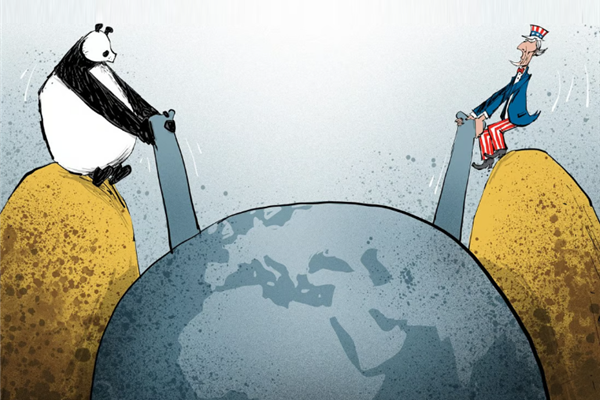As US-China rivalry heats up, soft power competition need not be a zero-sum game
SCMP | May 12 , 2023From SCMP, 2023-5-12
■ Both powers should restore cultural exchanges, academic ties, governmental dialogue and boost travel.
■ Collaboration on shared challenges from pandemics to climate change will only increase their influence.
By Wang Huiyao | Founder of the Center for China and Globalization(CCG)
In the past three decades, few concepts have been more influential in international relations than the idea of soft power. The term was coined in 1990 by political scientist Joseph Nye to describe the ability to get what you want through attraction, rather than coercion or payment.
Today, it feels like we are living in an age of intense soft power competition as the struggle between great powers extends beyond military and economic affairs into the realm of stories, images and information.
After the United States lost soft power during the Trump years, President Joe Biden made a concerted push to restore the country’s moral stature. He has made values central to foreign policy, positioning the US as the chief defender of the liberal order and pitting democracies against autocracies.
China has also embraced the idea of soft power. Leaders have stressed its importance and made large investments in public diplomacy. The concept has been the topic of countless papers and books published by Chinese scholars, as well as several seminars at our think tank, the Centre for China and Globalisation.
As great power rivalry heats up, soft power is often seen as a zero-sum game, a battle for influence and narratives between Washington and Beijing in which one side’s loss is the other’s gain. But as Nye stressed in our recent dialogue to mark the release of his new book, while the competitive aspects of soft power are undeniable, we should also remember that there are ways it can bring joint gains. This is an important insight as rising tensions between China and the US fuel talk of another cold war.
As Nye noted in our talk, our geopolitical situation is quite different from the US-Soviet face-off. Firstly, economic globalisation and value chains have bound the great powers of our age in a way quite unlike during the Cold War. For all the talk of decoupling, China-US trade in goods hit a record US$690.6 billion last year.
Second, even if a degree of economic decoupling does occur in some fields, China and the US are forever bound by an “ecological interdependence”. Climate change and pandemics threaten both sides because carbon emissions and viruses do not respect borders.
Nye calls China-US relations a “cooperative rivalry” because these global challenges demand cooperation even as the two sides compete. Unfortunately, amid the clamour over Taiwan, spy balloons and tech sanctions, there is too much emphasis on “rivalry” and not nearly enough on “cooperation”.
In 2009, Nye and Chinese scholar Wang Jisi described how soft power enables China-US cooperation, because it is much easier to work together if both sides like each other. If China is seen as unattractive in the US and demonised in the media or politics, the American public and policymakers are less likely to support cooperation with Beijing – and vice versa. Unfortunately, negative views of the “other side” now dominate in both countries, hindering cooperation on shared interests.
It doesn’t have to be this way. During the Cold War, even as Washington and Moscow threatened to destroy each other, American and Soviet scientists worked together to develop a vaccine for polio. In 2003, the US and China joined forces to combat the Severe Acute Respiratory Syndrome (Sars) outbreak. Unfortunately, such cooperation was lacking when it came to Covid-19, which probably worsened the impact of the pandemic.
China and the US are the world’s two biggest economies and carbon emitters. They are also the two science superpowers, accounting for over a third of the world’s research personnel and two-fifths of the scholarly output. If the two sides cannot work together, it will seriously undermine humanity’s ability to deal with the next pandemic, not to mention other global challenges like climate change.
One way the US and China can start to rebuild soft power is to restore their cultural ties and cooperation in research and academia, which have dwindled in recent years due to politics and the pandemic.
On top of delivering economic benefits and scientific progress, restoring bilateral academic exchange would help China and the US to improve mutual respect and understanding. Interactions with local colleagues are a catalyst for deeper interpersonal and commercial ties, trust and a sense of connection that can withstand bilateral frictions.
Academic exchange is crucial for the next generation of Chinese and American policymakers, entrepreneurs and scientists to be able to understand and work with each other. A 2022 survey shows that Chinese people who have studied or travelled in the US have more positive attitudes towards the country.
It is also important that more American students cross the Pacific to study, learn Chinese and build a pipeline of China literacy. But while there are about 295,000 Chinese studying in US universities, there are only around 350 American students on Chinese campuses, down from thousands a decade ago.
Now that China’s borders are open, both sides should work to restore academic exchanges and other cultural ties such as in tourism, as well as bilateral meetings at various levels of government. Both sides could explore questions such as: Do Chinese laws oblige Chinese companies to turn over foreign data at the government’s request, and does China’s military-civil fusion policy mandate that private Chinese companies have to turn over technology to the People’s Liberation Army, as many insist in the US? We think not.
Overzealous competition and disengagement will only hurt both countries’ soft power in the rest of the world. But if China and the US can work together to solve challenges like climate change or finding an end to the war in Ukraine, they can boost their influence and help inspire global cooperation.
From SCMP, 2023-5-12
Recommended Articles
-

Wang Huiyao: In a broken world, China-Japan-Korea cooperation is Asia’s backbone
-
Wang Huiyao: The outlook for multilateralism under the shadow of protectionism
-
Wang Huiyao: The US-China Thucydides Trap is by no means a foregone conclusion
-
Wang Huiyao: China’s Resilience and Commitment to Globalization
-
Wang Huiyao: China is ready to be an anchor in a brave new multipolar world
